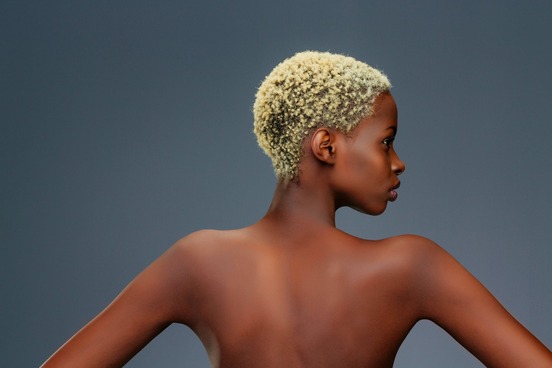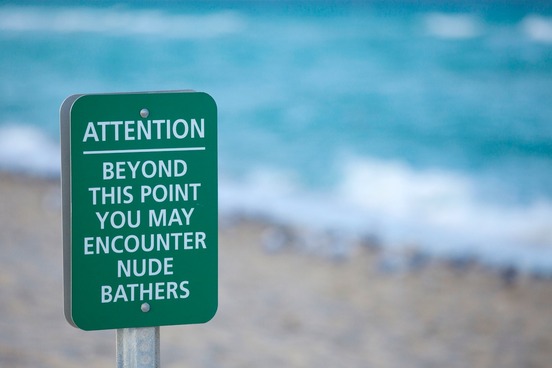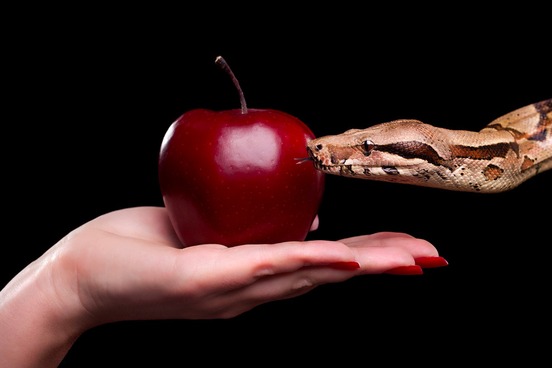
Birthday suit
Definition: unclothed skin; nakedness
Some people like to collect autoantonyms, words which mean a thing and its opposite, such as splice and cleave. No one ever seems to include birthday suit in these lists, even though the word has been used to mean both “a suit worn on one’s birthday” and “a state of nudity” (possibly because the clothing sense is now mostly obsolete). The use of birthday suit to indicate a state of nudity has been common since at least the middle of the 18th century.
The obliging Bride, to remove all incumbrances, stripp’d to her Buff, and two Women held a sheet between her and the Clergyman, while he performed his Office; but she having forgot her Cap at undressing, in the midst of the Ceremony it came into her Mind, and she pull’d that off too, and flung it on the Bed, and was married to her Spouse (if not in a Wedding Suit) in her Birth Day Suit.
—The Pennsylvania Gazette (Philadelphia, PA) 18 Jun. 1752

Bare-assed
Definition: in the nude; unclothed.
Bare-assed, which, you should know, is sometimes thought of as vulgar, is not a terribly new word. If you count it as a variant of the older British bare-arsed, it’s been used to refer to the unclothed for almost 400 years now.
There is nothyng more vayne, as your selfe tell can, Than to beg a breeche of a bare arst man.
—John Heywood, A Dialogue, 1546Afore God you ar bare arst, in all your religion.
—John Philpot, The Examincaion of the Constaunt Martir of Christ, 1556….whosoeuer shuld be chosen to be Christes vicar & Peters successour, he shuld first of al be set brechlesse & bare arsed in a certaine botomlesse chayre….
—Thomas Becon, The Reliques of Rome, 1563The Purple garments wherein you long did playe, By which your honour here you did receaue, Shall off be plucked, and all things else beside, And then the bare arsed Ape shall plaine be spide.
—Barnabe Googe, A New Booke Calle the Shippe of Safegard, 1569The residue like vnto the bare arssed rebels sculked to and fro; but in the end, they and the others were all dispersed, & durst not to appeare.
—Raphael Holinshed, The Second Volume of Chronicles, 1586
And yes, we know that’s more evidence for bare-arsed than you signed up for, but when you read a dictionary’s content you run the risk of 16th century ribaldry.

In the altogether
Definition: not wearing any clothes: nude
Our definition of this word includes the descriptors “informal” and “old-fashioned,” and if we were to be slightly uncharitable we might include “borne of error” as well since the term appears to have come from a literary misreading. In the altogether is believed to have come from Trilby, the 1894 novel by Geoge du Maurier, in which the titular heroine describes how she models (she describes it as “the altogether,” rather than “in the altogether”). This ‘altogether’ modeling was not necessarily meant to describe nudity in the book, but the public was glad to believe that it did (a Massachusetts newspaper breathlessly reported “Trilby, the heroine, is an artist’s model who earns her living by posing, nude or draped, either in portions or in the ‘altogether.’”)
A La Trilby. Egypt’s Pose was to be in “The Altogether.” Boston Daily Globe, 13 Jan. 1897

Full frontal
Definition: a photograph or film of a nude subject, who is seen directly from the front without any impediments to viewing. Also, pertaining or relating to such an image.
The words full and frontal were certainly used in tandem before the 1960s, but prior to this decade they did not appear to have a specific and fixed meaning that related to nudity (a “full frontal assault” typically would refer to an attack, either literal or figurative, made directly at a target). In the early 1960s the term was being used as an adjective, and by the beginning of the following decade had traded in any remaining clothes it might have had for another part of speech, and was being used as a noun as well.
The latest skirmish in film censorship, the case of Hugs and Kisses and the Full Frontal Nude (it sounds vaguely architectural, but apparently it’s a technical term in the trade) is rather characteristic.
—Penelope Houston, The Spectator (London, UK), 5 Apr. 1968

Au naturel
Definition: nude
Au naturel has not always, or even primarily, been used to refer to a state of undress. The English language borrowed it from French in the beginning of the 19th century, with the initial meaning of “in natural style or condition.” By the early 20th century au naturel was being employed to refer to a lack of clothing, rather than of artifice.
There were two other damsels on the stage who, though they had more clothes on, looked infinitely more au naturel. After all, it is not the quantity, it is the selection, which makes for a nude effect.
—The Tatler (London, UK), 15 Apr. 1914

In the buff
Definition: the bare skin
Some of the nudie words in English have etymologies that are pleasingly straightforward; starkers, for instance, comes from applying the -ers suffix to the stark portion of stark naked, which itself is the sense of stark meaning “to an absolute or complete degree”…um, that’s not actually so straightforward. Well, buff is in more or less the same convoluted vein, as it comes from the Italian word for buffalo, and came into English via the Middle French buffle. The nude buff and the enthusiast buff (as in theater-buff) both come from this same source. The enthusiast buff was originally applied to people who like to go watch fires (everyone needs a hobby), and who were so-called because of the overcoats worn by New York firefighters in the early 19th century, made of buff leather.
Once I was a couple. I was my own king and queen
with cheese and bread and rosé on the rocks of Rockport.
Once I sunbathed in the buff, all brown and lean,
watching the toy sloops go by, holding court
for busloads of tourists.
—Anne Sexton, The Book of Folly, 1972

Adamite
Definition: a person who imitates Adam in going naked; specifically : a member of any of various ascetic sects noted for practicing ritual nakedness in secret religious assemblies and dispensing with marriage on the basis of having entered a reborn state of heavenly innocence
For those occasions when you have the need of a single word with which you may describe a person who is not interested in wearing clothes, yet would prefer to eschew the use of nudist.
She is so pure, that sure she must
Be Transubstantiate, out of Dust .
She's free'd from, Passion, Hate, and Spite :
For Innocence, an Adamite:
Then learned Reader, tell (I pray)
If Angels can be made of Clay.
—Patrick Ker, Flosculum Poeticum, 1684





